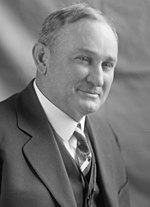Joseph Taylor Robinson
| Joseph Taylor Robinson | |
|---|---|
 |
|
|
United States Senator from Arkansas |
|
|
In office March 10, 1913 – July 14, 1937 |
|
| Preceded by | William M. Kavanaugh |
| Succeeded by | John E. Miller |
| Senate Majority Leader | |
|
In office March 4, 1933 – July 14, 1937 |
|
| Preceded by | James Eli Watson |
| Succeeded by | Alben W. Barkley |
| 23rd Governor of Arkansas | |
|
In office January 16, 1913 – March 8, 1913 |
|
| Preceded by | George Washington Donaghey |
| Succeeded by |
William Kavanaugh Oldham as Acting Governor |
| Member of the U.S. House of Representatives from Arkansas's 6th district |
|
|
In office March 4, 1903 – January 14, 1913 |
|
| Preceded by | Stephen Brundidge, Jr. |
| Succeeded by | Samuel M. Taylor |
| Member of the Arkansas Legislature | |
|
In office 1894 |
|
| Personal details | |
| Born | August 26, 1872 Lonoke, Arkansas |
| Died | July 14, 1937 (aged 64) Washington, D.C. |
| Political party | Democratic |
| Alma mater |
University of Arkansas University of Virginia |
Joseph Taylor Robinson (August 26, 1872 – July 14, 1937) was an American politician from Arkansas, of the Democratic Party. He was a state representative, U.S. Representative, 23rd Governor of Arkansas, U.S. Senator, Senate Majority Leader, and candidate for Vice president.
Robinson was born in Lonoke, Arkansas, the son of Matilda Jane (Swaim) and James Madison Robinson. He attended the University of Arkansas and studied law at the University of Virginia.
In 1894 Robinson was elected to the Arkansas Legislature and served one term. He was elected to the United States House of Representatives in 1902 from the Sixth District of Arkansas, and was re-elected to four subsequent terms, serving until 1913.
In 1912 Robinson was elected Governor of Arkansas. He resigned his U.S. House seat on January 14, 1913 and took office as governor on January 16. However, U.S. Senator Jefferson Davis had died on January 3, after the legislature had re-elected him to a new term beginning March 4, 1913; his seat was now open. On January 27, 1913, only 12 days after Robinson took office as governor, the legislature elected him to the U.S. Senate to replace Davis.
Robinson became the very last U.S. Senator elected by a state legislature rather than by direct popular vote. The Seventeenth Amendment, which required direct election, took effect on April 8, 1913. All the other Senators elected to terms starting in 1913 had been elected earlier; Senator James H. Brady of Idaho was elected to fill a vacancy on January 24; he was next to last.
...
Wikipedia
